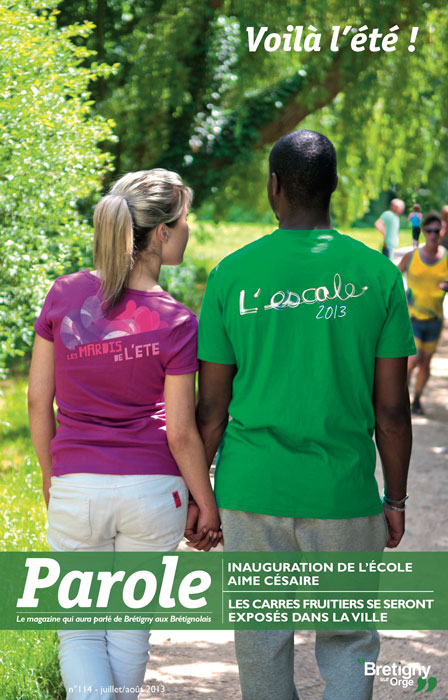N° 114 juillet-août 2013, Production CAC Brétigny
Parole in the future perfect
Each month, the inhabitants of Brétigny receive Parole, ‘the magazine on Brétigny for the people who live there’. Published by the municipality, it informs the inhabitants of Brétigny-sur-Orge on municipality news, important dates, articles on everyday life, the policies implemented by the elected officials, the opposition opinion column, work underway and practical information. In the summer edition (July-August 2013), the magazine was duplicated in a facsimile which was conjugated in the future perfect. This change in tense created an incongruity with the news by disturbing the temporality in which a monthly is usually written. The future perfect is an unusual tense in French in as much as it combines both the future and the past: that which hasn’t yet taken place with that which has already happened. By introducing this slight linguistic disruption, Parole in the future perfect brings readers to question themselves about their relationship with the publication and the political, cultural and social goings-on in the town in which they live.
Chaque mois, les Brétignolais reçoivent Parole, « le magazine qui parle de Brétigny aux Brétignolais ». Publié par la municipalité, il présente l’actualité de Brétigny-sur-Orge à ses habitants, les rendez-vous marquants, des dossiers sur la vie de tous les jours, la politique menée par les élus, la tribune de l’opposition, les travaux en cours et les informations pratiques. À l’occasion de son numéro d’été (juillet-août 2013), la revue se voit doublée d’un facsimilé dont la particularité est d’être conjugué au futur antérieur. Ce changement de temps opère un décalage par rapport à l’actualité, en troublant la temporalité dans laquelle s’inscrit d’ordinaire un périodique. Le futur antérieur est en effet un temps singulier dans la conjugaison française, en ce qu’il réunit à la fois le futur et le passé, ce qui n’a pas encore eu lieu et ce qui est déjà révolu. En introduisant cette légère perturbation dans la lecture, Parole au futur antérieur amène les lecteurs à s’interroger sur leur rapport à cette publication, à l’actualité politique, culturelle et sociale de la ville où ils habitent.
Version PDF disponible ici.
